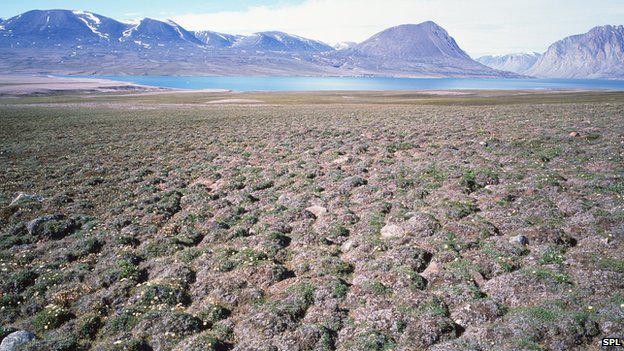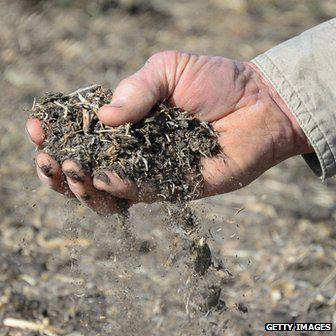Warning over vulnerability of soil carbon
to warming
By Matt McGrathEnvironment correspondent, BBC News

Colder soils are more vulnerable to releasing extra carbon in a warmer world
The huge stores of carbon locked in the world's soils are more vulnerable to rising temperatures than previously thought.
Researchers found that microbes in the soil were more likely to enhance the release of CO2 in a warming world.
Soils from colder regions and those with greater amounts of carbon were seen to emit more as temperatures went up.
The research has been published in the journal Nature.
The world's soils hold about twice the amount of carbon as the atmosphere.
Every year the activities of microbes in the soil on organic matter release around 60bn tonnes of carbon dioxide into the air.
Some studies have shown that these microbes can swing both ways when it comes to warming, with some able to reduce or even
eliminate the potential carbon losses.
This new work set out to test 22 different soil samples from the Arctic to the Amazon.
In their experiments the researchers cooked and cooled the material to ascertain how it responded to increased temperatures, over
the mid to long term, in this case defined as 90 days.
"There were some suggestions that microbes could get accustomed to higher temperatures with climate warming and then the
temperature sensitivity of soil respiration would decline," lead author Dr Kristiina Karhu from the University of Helsinki told BBC News.

Arable soils didn't increase the release of carbon as temperatures went up
"We show that for these 22 soils, this type of acclimation of microbial respiration doesn't really happen. Sometimes the opposite happens,
in response to long term temperature change, the microbes enhance the short term effect of temperatures so that the sensitivity
of respiration gets actually higher."
The research team found that soils from boreal regions and the Arctic were impacted the most, while arable or managed lands were
the only ones where microbes reduced the effects of a temperature change on the amount of carbon dioxide released.
Model muddle
The scientists aren't sure about the mechanism of action involved in this process.
"The soils that had this enhancing response were also soils that had a high carbon to nitrogen ratio," said Dr Karhu.
"So it could be something in this interaction between carbon and nitrogen cycles, and there are some studies that suggest that maybe
the enzymes related to nitrogen may be more temperature sensitive than the carbon related enzymes."
Whatever about the mechanism, the research implies that current soil carbon and Earth system models may be underestimating
the impact of warming on the huge reserves that sit in the ground.
After 90 days according to the study, "microbial community response increased the temperature sensitivity of respiration in high
latitude soils by a factor of 1.4 compared to the instantaneous temperature response".
According to Dr Karhu, this level of increase in colder regions raises concerns as more than half of the carbon that's stored in soils
in the world is found in these locations.
"It means that more carbon can be released from the northern soils than is projected by the models at the moment. This is worrying
because these soils have a lot of carbon."
There are many more questions about the impact of microbes that remain unanswered, especially the exact cause of the enhanced
release of carbon.
There is also interest in discovering which microbes are involved, and why arable or managed lands managed to reverse the effect.
More research needed say the experts.
"Big advances have been made in recent years, and there are now models that simulate key microbial processes," said Dr Iain Hartley,
from the University of Exeter, another author on the paper.
"We have a great opportunity to really advance this subject, and improve predictions of rates of carbon dioxide release from soils under
global warming, but there is still a huge amount that we need to understand better."
(Via BBC News)

Colder soils are more vulnerable to releasing extra carbon in a warmer world
The huge stores of carbon locked in the world's soils are more vulnerable to rising temperatures than previously thought.
Researchers found that microbes in the soil were more likely to enhance the release of CO2 in a warming world.
Soils from colder regions and those with greater amounts of carbon were seen to emit more as temperatures went up.
The research has been published in the journal Nature.
The world's soils hold about twice the amount of carbon as the atmosphere.
Every year the activities of microbes in the soil on organic matter release around 60bn tonnes of carbon dioxide into the air.
Some studies have shown that these microbes can swing both ways when it comes to warming, with some able to reduce or even
eliminate the potential carbon losses.
This new work set out to test 22 different soil samples from the Arctic to the Amazon.
In their experiments the researchers cooked and cooled the material to ascertain how it responded to increased temperatures, over
the mid to long term, in this case defined as 90 days.
"There were some suggestions that microbes could get accustomed to higher temperatures with climate warming and then the
temperature sensitivity of soil respiration would decline," lead author Dr Kristiina Karhu from the University of Helsinki told BBC News.

Arable soils didn't increase the release of carbon as temperatures went up
"We show that for these 22 soils, this type of acclimation of microbial respiration doesn't really happen. Sometimes the opposite happens,
in response to long term temperature change, the microbes enhance the short term effect of temperatures so that the sensitivity
of respiration gets actually higher."
The research team found that soils from boreal regions and the Arctic were impacted the most, while arable or managed lands were
the only ones where microbes reduced the effects of a temperature change on the amount of carbon dioxide released.
Model muddle
The scientists aren't sure about the mechanism of action involved in this process.
"The soils that had this enhancing response were also soils that had a high carbon to nitrogen ratio," said Dr Karhu.
"So it could be something in this interaction between carbon and nitrogen cycles, and there are some studies that suggest that maybe
the enzymes related to nitrogen may be more temperature sensitive than the carbon related enzymes."
Whatever about the mechanism, the research implies that current soil carbon and Earth system models may be underestimating
the impact of warming on the huge reserves that sit in the ground.
After 90 days according to the study, "microbial community response increased the temperature sensitivity of respiration in high
latitude soils by a factor of 1.4 compared to the instantaneous temperature response".
According to Dr Karhu, this level of increase in colder regions raises concerns as more than half of the carbon that's stored in soils
in the world is found in these locations.
"It means that more carbon can be released from the northern soils than is projected by the models at the moment. This is worrying
because these soils have a lot of carbon."
There are many more questions about the impact of microbes that remain unanswered, especially the exact cause of the enhanced
release of carbon.
There is also interest in discovering which microbes are involved, and why arable or managed lands managed to reverse the effect.
More research needed say the experts.
"Big advances have been made in recent years, and there are now models that simulate key microbial processes," said Dr Iain Hartley,
from the University of Exeter, another author on the paper.
"We have a great opportunity to really advance this subject, and improve predictions of rates of carbon dioxide release from soils under
global warming, but there is still a huge amount that we need to understand better."
